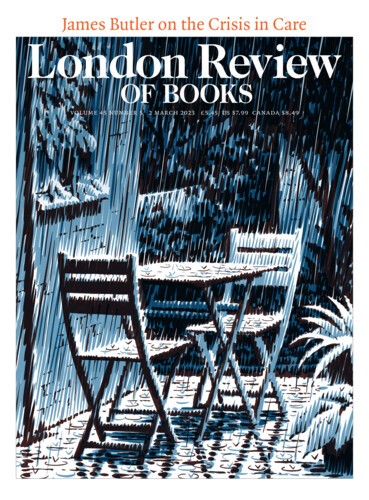One of Labour’s least attractive peculiarities is how restless it gets when deprived of opportunities for self-flagellation. It could have greeted last Thursday’s by-election results simply by stressing the obvious – that the country is repulsed by the Conservatives, for whom these elections were a disaster – and reciting the usual pieties about the need to supplicate further in suburbia. Instead the party has erupted in hopeless overreaction.
James Butler
James Butler is a contributing editor at the LRB and the host of the podcast On Politics. He co-founded Novara Media in 2011 and hosted its weekly radio show for several years.
Infinite Artichoke: Italo Calvino’s Politics
James Butler, 15 June 2023
Italo Calvino has an image problem. He has been pigeonholed as an Italian Queneau or a knock-off Borges. His admirers proselytise – not always helpfully – about The Joy of Semiosis. Reviewers have tried to account for his interest in narrative at both the level of theory and pleasure by calling him a ‘storyteller’, meaning that he wrote books that are both compelling...
After the grovelling, thousands of troops processed in armed celebration. Somewhere beyond the cordon, the Metropolitan Police arrested a few republicans for precrime. Commentators purred that this, after all, is what Britain does best.
This Concerns Everyone: Crisis in Care
James Butler, 2 March 2023
Translating ethical urgency into a politics of care would not lack for pathologies: it would be potentially suffocating, conformist, a licence for moral scolds wielding duty as a cudgel and inclined to conceal abuse. But the urgency remains. All of us depend, in early age and often at the end of life, on the care of others. We are shaped by individual, consequential but highly contingent acts of care, or their absence. To think about care is to shuttle back and forth between social totality and the irreducible complexity of individual needs, from feeding or washing to dignity or meaningful attention. Because it concerns the state, care must be thought of in the aggregate – unit costs, labour time, population trends – but many carers worry that such categories miss everything significant about their work. It doesn’t help that so many definitions of care are vague or tautologous, constituting the entire range of social activities that allow human beings to exist in the world.
The spectacle of fringe libertarianism crashing and burning on contact with the real world would be funny if we didn’t have to live through the consequences. It isn’t clear what Conservatives think conservatism is any longer: what aspect of actually existing British society (rather than ersatz Victorian fantasy) they seek to conserve, or even what they think the roots of the country’s problems in fact are. The easy, nonsense answers – Remainer fifth columnists, decadent critical race theorists and debauched metropolitans – have their idiot adherents still, some of them sincere and dangerous rather than merely cynical. But they are fictions that won’t stand up to the very real problems of the winter now bearing down on us.
Podcasts & Videos
On Politics: Do bond markets and the Bank of England run Britain?
Daniela Gabor, Andrew Haldane and James Butler
Andy Burnham recently said that the government is ‘in hock to the bond markets’, and the political turbulence of the past few years, not least the downfall of Liz Truss following her ‘mini-budget’,...
On Politics: Labour's Problems
James Butler, Chris Mullin, Andy Beckett and Morgan Jones
In this first episode of a new strand in the LRB Podcast, host James Butler talks to former Labour MP and minister Chris Mullin, columnist Andy Beckett and journalist Morgan Jones about whether Labour...
On Politics: Latin America’s Right-Wing Shift
Camila Vergara, Tony Wood and James Butler
James is joined by Tony Wood and Camila Vergara to discuss why the Pink Tide governments in Latin America failed, where the new brand of right-wing politics comes from, and whether the revolutionary energy...
Sorry State
James Butler and Thomas Jones
In the run up to the local elections, and following his recent piece on the care crisis, James Butler joins Tom to discuss some of the other problems facing the UK, and what the two major parties are promising...
Grief Totalitarianism
James Butler, Florence Sutcliffe-Braithwaite and Thomas Jones
James Butler and Florence Sutcliffe-Braithwaite talk to Tom about Britain's new monarch and Prime Minister.
After Johnson
James Butler and Thomas Jones
James Butler joins Tom to consider the fall of Boris Johnson, the candidates hoping to replace him, and what the next few years of British politics might look like.
The Climate Colossus
Geoff Mann and James Butler
Geoff Mann talks to James Butler about the economic models developed by William Nordhaus and others, widely used by governments around the world as a tool to tackle climate change.
Read anywhere with the London Review of Books app, available now from the App Store for Apple devices, Google Play for Android devices and Amazon for your Kindle Fire.
Sign up to our newsletter
For highlights from the latest issue, our archive and the blog, as well as news, events and exclusive promotions.



